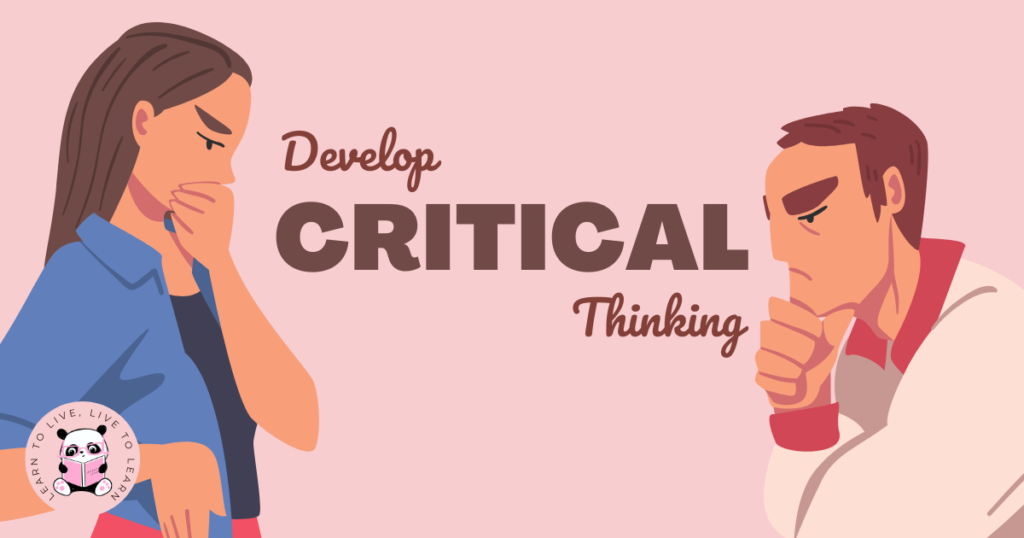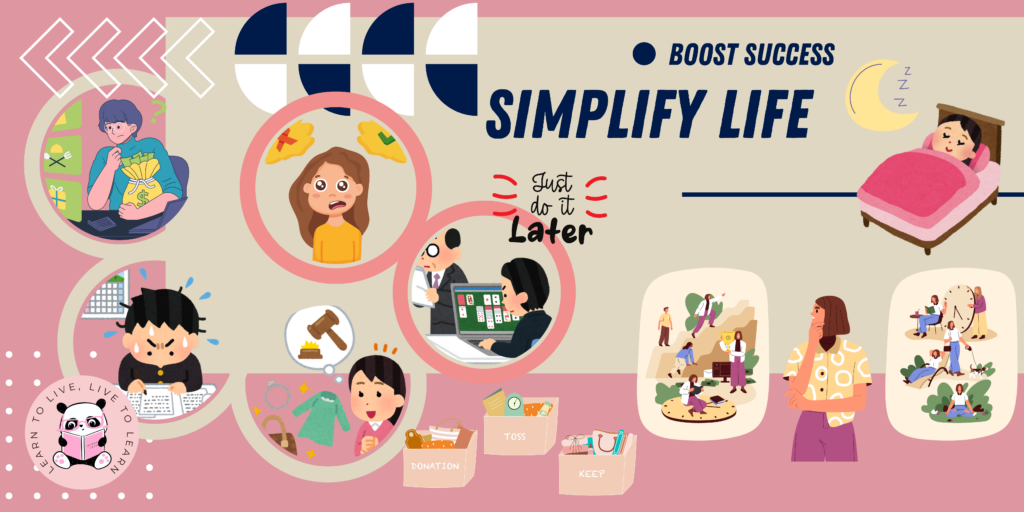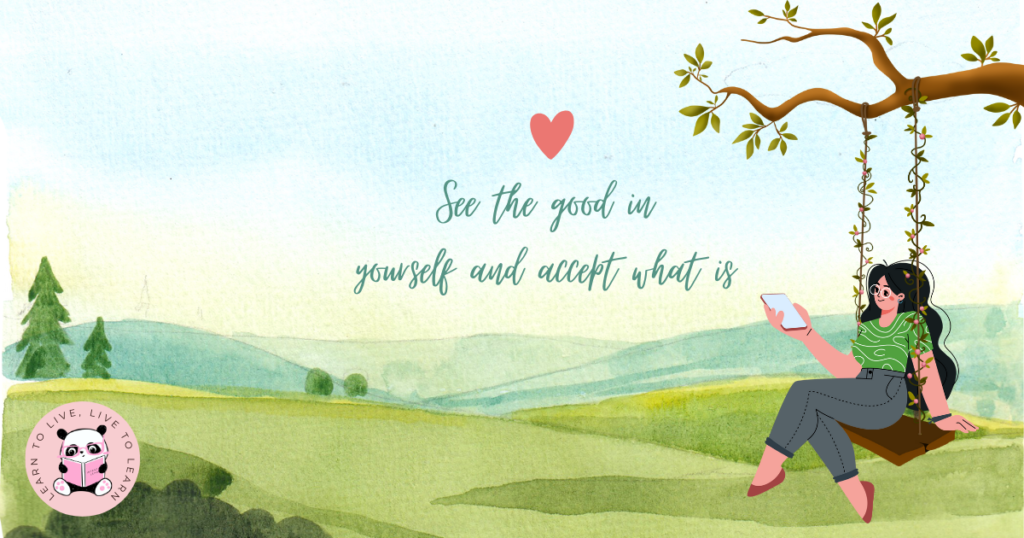Stop Doing These Dumb Things To Avoid Self-Sabotage
Written by Michelle Ong | April 17, 2024 | Growth, Wellness

Check out seven short philosophical stories to help you spot and overcome self-sabotaging behaviors.
Sometimes, we don’t realize how our actions create problems, upset others or hold us back. We may focus on short-term gains without thinking of the consequences. This article highlights such behaviors and encourages reflection to avoid self-sabotage. Through seven short stories, it offers inspiration, practical tips, and ways to boost self-awareness, helping us thrive personally and professionally.
1. Blind Trust
In a peaceful village surrounded by hills, there lived a young woman named Sora, known for her kindness. One day, a tired traveler named Ming arrived. He had escaped from his village, which was attacked by bandits, losing everything he owned. Ming appeared vulnerable and frightened, prompting Sora to offer him help without hesitation. She welcomed Ming into her home, providing him with food, shelter, and warmth. Ming pretended to be thankful and shared stories of his past hardships, gradually earning Sora’s trust. However, he took advantage of her kindness for his own selfish means.
Unbeknownst to Sora, Ming harbored ulterior motives, his charming appearance masking a heart consumed by greed and deceit. As weeks passed, whispers of theft and deception began to circulate through the village, casting a shadow of doubt upon the once-tranquil community. It was not until Sora discovered her cherished possessions missing, and her trust betrayed, that she realized the true nature of Ming’s intentions.
Sora felt deeply hurt and betrayed, losing faith in people she once trusted. Through her pain, she learned a tough lesson: blindly trusting others, though kind-hearted, can lead to sadness and betrayal. But from this experience, Sora grew stronger and wiser. She promised herself to balance kindness with caution, protecting her heart from those who might take advantage of her trust.
Learnings: Balancing kindness with caution is important because blindly trusting others can leave one vulnerable to deception and exploitation. Therefore, it’s crucial to be discerning when it comes to relationships, mindful that trust should be earned and maintained with vigilance.
2. Ego
“Ego is the anesthesia that deadens the pain of stupidity.”
Frank Leahy
Sun was a skilled archer with unmatched skills. As he hit bullseye after bullseye, Sun’s ego swelled like a storm cloud. Believing himself invincible, he boasted loudly of his abilities, dismissing the counsel of his peers with a haughty wave of his hand. Blinded by pride, Sun grew reckless, forsaking the discipline and focus that had once defined his skill. One fateful day, during a grand archery competition, Sun’s arrogance led him to ignore the warnings of his mentors and rush his shot. With a thunderous crack, the bowstring snapped, recoiling with a force that sent Sun sprawling to the ground in defeat.
As he lay amidst his shattered ego, Sun realized the folly of his arrogance and the destructive power of pride. From that day forth, humbled by his fall from grace, Sun vowed to temper his skill with humility, understanding that true mastery is not found in the boastful words of the ego, but in the silent wisdom of the heart.
Learnings: Real skill isn’t about boasting or showing off; it’s about being humble, recognizing your limits, and staying open to learning from others. Letting your ego run wild will only trip you up in the end. Believing you can handle everything alone is a recipe for trouble. Remember, nobody’s perfect; we all have blind spots. Embracing humility means admitting there are things you don’t know and being okay with that. So, stay humble, stay curious, and keep growing!
3. Living In The Past & Future
“Yesterday is history, tomorrow is a mystery, but today is a gift. That’s why it’s called the present.”
Alice Morse Earle
There was a young monk named Kong. He spent a lot of time worrying about the future and regretting things from the past. Kong was always thinking about his duties as a monk, becoming enlightened, and living up to what others expected of him. These worries made it hard for him to enjoy the present moment. He often thought about things he wished he had done differently, which made it difficult for him to feel peaceful.
But one night, while meditating under the stars, Kong had an epiphany. Amidst his thoughts of past regrets and anxieties about the future, a subtle shift occurred within him. As he gazed up at the vast expanse of the night sky, each twinkling star seemed to whisper a silent message of reassurance. Suddenly, it was as if a veil had been lifted, revealing the profound truth that had eluded him for so long. In that transcendent moment, Kong realized the futility of dwelling on what had been or what might be, for the only reality was the present moment, shimmering with infinite possibility. He decided to let go of his worries and find peace in the here and now, understanding that true happiness lies in the present.
Learnings: Embrace the present moment, because dwelling on past regrets or future anxieties only clouds the beauty of life’s essence. True happiness and fulfillment await in the here and now.
4. One-Track Thinking
In a quiet village surrounded by green hills, there lived a hardworking farmer named Jun. He diligently tended to his fields every day, sticking to the traditional methods passed down through generations. Jun relied on manual labor and old-fashioned irrigation, refusing to adopt modern techniques such as drip irrigation, crop rotation, and soil testing suggested by his neighbors. He stubbornly clung to the familiar ways of the past, convinced that deviation would lead to ruin. However, when drought struck and his crops began to fail, Jun realized the consequences of his inflexibility.
With his fields barren and his morale low, Jun realized the error of his ways. He learned that real progress comes from being open to change and that holding onto old outdated beliefs only harms oneself. From then on, Jun welcomed new ways of doing things, knowing that success comes from being flexible and resilient.
Learnings: Clinging to outdated beliefs and methods is like trying to swim against the current. Stay open to change and new ideas; be adaptable and resilient. And be ready to pivot when needed to seize new opportunities as they come your way.
5. Chasing Perfection
“Continuous improvement is better than delayed perfection.”
Mark Twain
A young artist named Min was known far and wide for her amazing paintings. Since she was little, Min dreamed of creating the most beautiful art ever seen. She spent hours in her small studio, working hard to make her paintings perfect. But no matter how much she tried, Min felt like her art never reached the level she wanted. Every stroke of her brush and every color choice left her feeling unsatisfied. She was frustrated and disappointed, struggling to make her art match the vision in her mind.
A wise elder crossed paths with Min one day, sharing insights about how everything changes over time and the beauty found in nature’s imperfections. Inspired by these words, Min’s outlook shifted. She realized that true artistry wasn’t about chasing perfection but expressing herself authentically. Accepting the flaws in her work, Min’s creativity flourished, and her paintings gained a new depth of emotion. With the weight of unrealistic expectations lifted, Min found joy in the creative journey, learning that true beauty lies in embracing imperfection and celebrating each unique brushstroke.
Learnings: True beauty lies in embracing imperfection and authenticity, a concept echoed in the philosophy of wabi-sabi. Pursuing perfection stifles creativity and robs us of the joy of the creative process. By embracing wabi-sabi, we learn to appreciate the beauty in imperfection and cherish the uniqueness of each moment.
6. Second Guessing
“Doubt kills more dreams than failure ever will.”
Suzy Kassem
A young monk An struggled with self-doubt on his path to enlightenment. Despite his dedicated meditation and study, he questioned his worthiness, fearing he lacked the wisdom and purity needed. Turning to his wise teacher for guidance, An learned a valuable lesson from the story of the acorn and the oak tree. The teacher explained how each person, like the small acorn, holds the potential for greatness and enlightenment, waiting to grow into something magnificent.
Inspired by this analogy, An saw his self-doubt as a barrier to his true potential. With newfound courage, he embarked on a journey of self-discovery, trusting in his innate wisdom. Each day, An approached his practice with renewed confidence and conviction, understanding that while doubts may linger, they could never extinguish the flame of his spirit. With patience and perseverance, he learned to overcome his fears, embracing the path ahead with confidence, knowing enlightenment awaited.
Learnings: Believing in yourself and trusting your ability to grow can change your life. Self-doubt might make you feel stuck, but it doesn’t define what you can achieve. Everyone has doubts sometimes, but don’t let them stop you. Dig deep, find that courage, and trust yourself. You’ve got what it takes to conquer your goals and turn your dreams into reality. So, go ahead, unleash your inner superhero and show the world what you’re made of!
7. Self-Centered
A wealthy merchant named Li was self-entitled and self-centered. He demanded preferential treatment from customers, demanding special privileges and discounts without considering their potential difficulties. Li acted superior, expecting others to accommodate his every whim without question. Whether dominating conversations with tales of his own success or disregarding the needs of those around him, Li showed little concern for others’ feelings or circumstances. He thought his wealth gave him the right to take whatever he wanted, without considering how it affected others. This mindset blinded him to the suffering of those around him, leading to a growing disconnect from his community.
However, a wise elder’s advice made Li rethink his behavior. Realizing the folly of his ways, he humbly sought to mend relationships and help others with kindness and generosity, discovering that true fulfillment comes from selflessness and helping others. The elder’s wisdom showed Li that his selfish actions not only hurt those around him but also prevented him from experiencing genuine fulfillment and connection.
Learnings: True fulfillment comes from selflessness and helping others. When you prioritize your own needs and desires without considering others, it creates barriers to meaningful relationships and genuine happiness. Selfish actions not only hurt those around you but also prevent you from experiencing genuine fulfillment and connection. It’s like building walls around yourself, shutting out the joy that comes from connecting with others. But when you embrace empathy and prioritize the well-being of others, it benefits not only those around you but also nurtures a sense of purpose and fulfillment within yourself. So, break down those walls, reach out to others, and discover the true joy of making a positive impact on the world around you.
How To Avoid Self-sabotage
“Success is not final, failure is not fatal: It is the courage to continue that counts.”
Winston Churchill
Avoiding self-sabotage starts with understanding our habits, like fear of failure and procrastination, through self-awareness. We need to prioritize self-care, think things through carefully, and avoid rushing change or neglecting our own needs just to please others.
Setting boundaries and saying no are crucial for well-being. Being kind to ourselves, using positive self-talk, and seeking support when needed are essential. By reflecting and being mindful, we can better understand ourselves and grow. Trust the process and be patient with your personal growth.
Take a look at related posts on common bad habits to avoid and tips to help you thrive in life.
Like what you are reading? Pin & share this post with your family and friends, and I would greatly appreciate if you could support my blog by following me on Pinterest!


